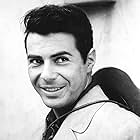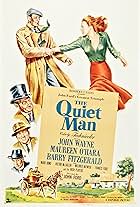In the waning days of World War II, the cargo officer of a Navy supply ship chafes at its role far from the action in the Pacific's backwater areas, his frustration rising when its captain d... Read allIn the waning days of World War II, the cargo officer of a Navy supply ship chafes at its role far from the action in the Pacific's backwater areas, his frustration rising when its captain denies the crew liberty over petty irritations.In the waning days of World War II, the cargo officer of a Navy supply ship chafes at its role far from the action in the Pacific's backwater areas, his frustration rising when its captain denies the crew liberty over petty irritations.
- Won 1 Oscar
- 4 wins & 6 nominations total
- Mannion
- (as Phil Carey)
- Bookser
- (as Pat Wayne)
- Wiley
- (as Tiger Andrews)
Featured reviews
The story of "Mister Roberts" is a bit melodramatic for my taste -- after all, it started out on Broadway -- but it doesn't matter because you have five huge headliners to carry it, all at different stages of their careers -- William Powell in his last feature film; James Cagney, James Fonda, and Ward Bond in their mid-career phases (though Bond would be cut down too young in 1960); and Jack Lemmon in practically his first movie. There is an outstanding photo of these five actors singing together accompanied by Cagney's guitar in the photo gallery. Anyway, Mister Roberts is a college-grad who felt a duty to be involved in WWII, but who had the bad luck to be assigned to a cargo ship that is never involved in combat duty. What's worse, the commanding officer is a petty Merchant Marine who got in the Navy because they needed anyone they could get, and he resents Mister Roberts and anyone else who he thinks looks down on him. Roberts shares a room with Ensign Pulver, not exactly a coward but someone who'd be happy to go through the entire war without meeting his Captain. The ship's surgeon is played by William Powell with the same wit and facile mastery that he brought to the "The Thin Man" series decades earlier; but you can tell he's not Nick Charles because of his gray hair. Finally, the great Ward Bond is the top noncom in the cargo hold.
The movie depends on a lot of stereotypes that feel like crutches to me -- sailors ogling women, sailors getting drunk, sailors going nuts on liberty, etc. The high points of the action involve the interaction of the headliners, or their solo moments. Jack Lemmon's outstanding (and Oscar-winning) performance established him as an up and coming star, and presaged his great work in "The Apartment", "Some Like it Hot", "The Days of Wine and Roses", and the other masterpieces of his "Early" period. The final scene is one of the best in Lemmon's career.
I strongly recommend you find a way to see "Mister Roberts" in widescreen format. This is a movie, like "Lawrence of Arabia" or "Anastasia", that is just ruined when presented full-screen.
The captain grew up poor and this did not teach him empathy for his fellow man when he climbed out of poverty and became an officer. Instead he just learned to be the ultimate bully. He denies the crew privileges because he can, but he is always interested in schmoozing superior officers whom he deems as important. In the words of "Philadelphia Story", In spite of the fact that somebody's up from the bottom, he can still be quite a heel. "
The crew idolizes Roberts because he is constantly antagonizing their tormenter. But then one day the Captain holds the crew's much deserved and much needed liberty for ransom - Roberts has to stop writing requests for transfers and act like he is toadying to the captain from now on and moreso keep this arrangement secret - and Roberts has to choose.
Because the film is about boredom during wartime, it would be easy for this film to be - well - boring, but to its credit it is not. This is because of all of the small scenes involving the four leads and the outstanding cast. Henry Fonda starred as Mr. Roberts onstage, and it is said he actually directed parts of it after John Ford walked off. William Powell makes his last film appearance as the ship's surgeon, "Doc", and he has some scenes that have that wily and humorous Powell greatness while delivering words of wisdom or a recipe for fake Scotch. Jack Lemmon won a Best Supporting Actor Oscar for his role as Ensign Pulver, a slimy little weasel and wannabe womanizer who has potential.
I'd recommend this even if you are not particularly fond of war films - I'm not and I enjoyed it a great deal.
Fonda and Cagney are wonderful as the battling duo who fight over the morale of the ship's crew. Human sacrifice comes in many forms, and Fonda's character demonstrates them all through the course of the film.
Mixing comedy with genuine issues of human dignity, the film is a true classic.
When my now nineteen year old nephew was younger, he would ask to watch my copy of 'Mister Roberts' on VHS just for the hilarious scene where Pulver blows up the laundry and the ship starts to fill up with soap suds. I have a copy of the play which includes pictures from when Fonda played the role of Doug Roberts on stage, and there are some differences from the play, but those differences certainly work in this movie.
I can't imagine better casting for any of these parts--
Henry Fonda as Doug Roberts
Jack Lemmon as Ensign Pulver
Ward Bond as Dowdy
William Powell as Doc
This is an excellent story of a man who yearns to serve in a war, but yet not to be a hero. He just wants to do his part, and he thinks that in order for his part to be important he has to be in combat. It takes him a while, and a few lectures from Doc, to realize that what he and the crew on the 'bucket' on which they serve do a necessary and important job even as they sail from boredom to tedium and back again, as Roberts says in his letter to Pulver in one of the movie's last scenes. The men are bored, and they can't stand their captain; and during the scene where the captain calls them to their battle stations after finding his special palm tree missing most of them aren't even sure where their battle stations are! The character of Doc has never even seen a battleship and he's in the navy. The entire movie is worth just the scenes of the crew returning from liberty, the making of the scotch, and the soap suds incident.
For a while when I was up at Northern Arizona University I had these lines from the opening scene as part of my answering machine message:
"Now here this. Now here this. Revelry. I repeat...revelry! Attention all hands..."
I recommend this movie very highly and rate it nine out of ten stars!
Did you know
- TriviaWilliam Powell's last film, his final film appearance. He had marked difficulties retaining his lines, something that had not happened to him in earlier films. This, along with frail health (including bouts with cancer) plus a difficult Hawaii location shoot, ultimately led to the actor's decision to retire.
- GoofsIn the scene where the ship is underway and at general quarters, several shots of the bridge show that there is no one at the helm (steering the ship).
- Quotes
[last lines]
Ensign Frank Thurlowe Pulver: Captain, it is I, Ensign Pulver, and I just threw your stinkin' palm tree overboard! Now what's all this crud about no movie tonight?
- Crazy creditsThe seven top-billed actors listed in the opening credits are not listed with the other players in the end credits.
- Alternate versionsTelevision and the standard VHS prints substitute a different march that is played over the loudspeakers during the scene where Henry Fonda is listening to the VE Day celebrations and throws the captain's palm tree overboard. Also eliminated is the voice-over of Fonda humming the march as he walks up the gang ladder leaving the scene.
- SoundtracksIf I Could Be with You One Hour Tonight
(uncredited)
Music by James P. Johnson
Words by Henry Creamer
Published by Warner Bros. Inc. (ASCAP)
Sung, hummed and whistled by Jack Lemmon throughout film (uncredited)
Details
Box office
- Gross US & Canada
- $21,200,000
- Runtime2 hours 3 minutes
- Aspect ratio
- 2.55 : 1
Contribute to this page










































